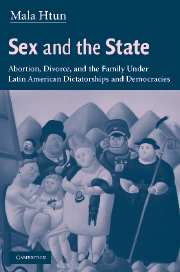 Sex and the State
Sex and the State Book contents
- Frontmatter
- Contents
- Acknowledgments
- Note on Translations
- 1 Sex and the State in Latin America
- 2 Four Normative Traditions
- 3 Reforming Women's Rights Under Military Dictatorships
- 4 Church and State in the Struggle for Divorce
- 5 Completing the Agenda: Family Equality and Democratic Politics
- 6 Why Hasn't Abortion Been Decriminalized in Latin America?
- 7 Conclusion
- References
- Index
6 - Why Hasn't Abortion Been Decriminalized in Latin America?
Published online by Cambridge University Press: 08 January 2010
- Frontmatter
- Contents
- Acknowledgments
- Note on Translations
- 1 Sex and the State in Latin America
- 2 Four Normative Traditions
- 3 Reforming Women's Rights Under Military Dictatorships
- 4 Church and State in the Struggle for Divorce
- 5 Completing the Agenda: Family Equality and Democratic Politics
- 6 Why Hasn't Abortion Been Decriminalized in Latin America?
- 7 Conclusion
- References
- Index
Summary
Abortion is one of the most thorny policy problems faced by modern democracies. Few other issues provoke comparable moral outrage and political polarization. Feminist and liberals see abortion as a question of individual liberty, privacy, and public health; social conservatives maintain that prohibitions on abortion are necessary to protect human life, defend human rights, and uphold moral and family values. Abortion thus involves a “clash of absolutes” (Tribe 1992) between which there is seemingly little ground for compromise. Beneath the rhetoric and the ideology, however, serious public health questions surround the problem of abortion. In countries where abortion is illegal, many women undergo the procedure in clandestine circumstances at great risk to their health. Complications from botched abortions are a leading cause of maternal mortality in many countries and produce a major drain on the public health system. The black market in illegal abortions contributes to corruption and a lack of respect for the rule of law. The problem of abortion demands urgent resolution, yet there is little political will to entertain serious debates about decriminalization.
In Latin America, with the exception of Cuba, the legal status of abortion has changed very little since the promulgation of modern criminal codes in the late nineteenth and early twentieth centuries. These codes criminalized abortion in general, but most did not punish people for performing abortions when the pregnancy threatened the mother's life (“therapeutic” reasons).
- Type
- Chapter
- Information
- Sex and the StateAbortion, Divorce, and the Family under Latin American Dictatorships and Democracies, pp. 142 - 171Publisher: Cambridge University PressPrint publication year: 2003


